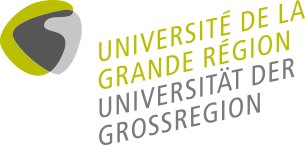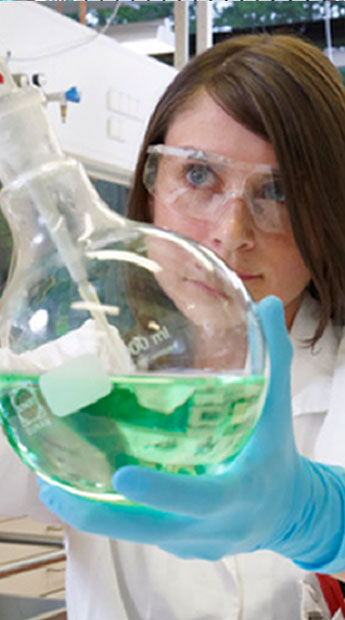UniGR key area: Biomedicine
The Biomedicine key area is very diverse, pooling researchers from various disciplines in the biological sciences and medicine, such as bioinformatics, systems biology, molecular and cellular biology, psychology, pharmacy, and epigenetics.
Interdisciplinary research networks are thus created within the Greater Region for researching the causes of diseases and searching ways of healing in the context of cross-border projects.
The following research networks have already been constituted:
Big Data - Challenges and Opportunities
A one-day UniGR workshop, co-organised with the Luxembourg Centre for Systems Biomedicine (LCSB), took place on December 6th 2013 in Luxembourg.
While it is widely recognized that we need more data-driven decision-making processes, there is still a wide gap between the current situation and the potential and realization of the notion “Big Data”. In the life sciences we are at the border of having the data rolling in but not having the machinery and pipelines in place to use them in an efficient and innovative way.
Joint efforts and discussions among different academic groups – biologists, computer scientists, bioinformatics, mathematicians and others - are needed to deal with challenging data management and analysis demands.
For that reason, UniGR brought together researchers from the Greater Region.
Cancerology & Microbiome
In the last ten years, new knowledge about the human microbiome has created a paradigm shift in our view of human biology and human disease. New scientific technologies like DNA sequence analysis have revealed a rich and complex community of microorganisms which are resident in and on the human body. It is becoming increasingly apparent that these microbial communities, which number in the trillions and represent thousands of bacterial, viral and fungal species, do not cause disease but, in fact, are required for normal human development and for lifelong health.
Within this group of researchers, the link between tumorgenesis and human microbiome is investigated with regard to cancer prevention and cancer therapy efficacy.
Contact: Prof. Dr. Jochen Schneider, Luxembourg Centre for Systems Biomedicine, University of Luxembourg
Cartilage
The Cartilage Net of the Greater Region was founded as a UniGR pilot activity and initiated by Prof. Madry from Saarland University. This network unites all relevant cartilage researchers in the Greater Region from all kinds of disciplines, medical scientists, molecular biologists, engineers and pathologists.
The partners from Lorraine, Luxembourg, Saarland and Wallonia do not only come from the UniGR partner universities, but also from clinics and external research institutes.
Find more information on activities and events of the Cartilage Net of the Greater Region on the website of Prof. Madry.
Modulation of eating behaviour through deep brain stimulation (MIB-DBS)
Eating disorders such as anorexia nervosa, bulimia nervosa and binge eating disorder and disordered eating behaviours associated with morbid obesity show a rise in prevalence across much of the industrialised countries. While efforts continue to better understand the processes underlying these conditions, their successful treatment often represents a real challenge.
More importantly, eating disorders and their associated conditions affect an increasing number of children and adolescents. Conventional treatments comprise cognitive behavioural therapy (CBT), family based treatments and pharmacotherapy. Although these approaches produce better outcomes than previous treatments, their still limited success has encouraged neuro-cognitive and physiological approaches, e.g. vagus nerve stimulation, transcranial magnetic stimulation, transcranial direct stimulation as well as deep brain stimulation (DBS). Given their relative novelty, there are few systematic studies that test the underlying mechanism (e.g. the optimal location for the intervention) of these approaches, possible ways of optimizing these treatments (e.g. through neuro-monitoring etc.) and their long-term consequences.
A workshop was organised on the initiative of Jochen Schneider (Saarland University & University of Luxembourg), Claus Vögele (University of Luxembourg / INSIDE Institute for Health and Behaviour) and Frank Hertel (Centre hospitalier de Luxembourg), on 27 February 2015.
Psychobiology & Health
Following three workshops on "Psychobiology & Health" organised in 2014, a cross-border research group involving the UniGR partner universities has gathered around Claus Vögele (University of Luxembourg) and Hartmut Schächinger (Trier University) to deepen the cooperation in the field of "A systems approach to stress".
Redox Biology
Redox processes are of pivotal relevance for all cellular functions. The analysis of redox reactions has a long history but only the recent technical advances, for example in the visualization of intracellular redox changes or in the proteome-wide determination of oxidative modifications, showed the impressive relevance of redox process for all aspects of life sciences, ranging from basic research in biology to applied biotechnology and medicine. The biochemical principles as well as the physiologic roles of redox processes are studied by a large number of research groups working at the universities of the Greater Region (Homburg, Liège, Luxembourg, Kaiserslautern, Metz, Nancy, Saarbrücken and Trier).
Contacts :
TU Kaiserslautern, Cellular Biology
University of Lorraine
Saarland University, Biophysics
Systems Biology
The modern research fields of Systems Biology/Medicine and Epigenetics are central research activities at several UniGR partner sites. UniGR workshops have in the past been organised by Prof. Volkhard Helms (Saarland University) and Prof. Thomas Sauter (University of Luxembourg) as well as by the research unit BioComp - Complex Data Analysis in Life Sciences and Biotechnology – of the TU Kaiserslautern (scientific coordinator Dr. Dorothea Hemme).
Contact details of the involved researchers can be provided by the UniGR officers.



